The second International Conference of Government and Economics, co-hosted by the School of Social Sciences of Tsinghua University, the Society for the Analysis of Government and Economics (SAGE), and the Academic Center for Chinese Economic Practice and Thinking (ACCEPT) was held on September 26 at Tsinghua University. The conference was attended by Xiang Botao, Deputy Secretary of the CPC Committee of Tsinghua University and Vice Chairperson of the University Council; Zhu Guangyao, former Deputy Minister of the Ministry of Finance; Dong Zhiyong, Assistant President and Dean of the School of Economics of Peking University; Liu Shouying, Dean of the School of Economics of Renmin University of China; Eric S. Maskin, 2007 Nobel Laureate in Economics, Adams University Professor and Professor of Economics and Mathematics at Harvard University, and Co-president of SAGE; Jan Svejnar, the James T. Shotwell Professor of Global Political Economy and Director of the Center on Global Economic Governance at Columbia University; Erik Berglof, Chief Economist of the Asian Infrastructure Investment Bank; as well as other additional guests. David Daokui Li, President of ACCEPT at Tsinghua University and Co-president of SAGE, delivered the opening remarks. Li Ke’aobo, Vice President of ACCEPT, presided over the conference.
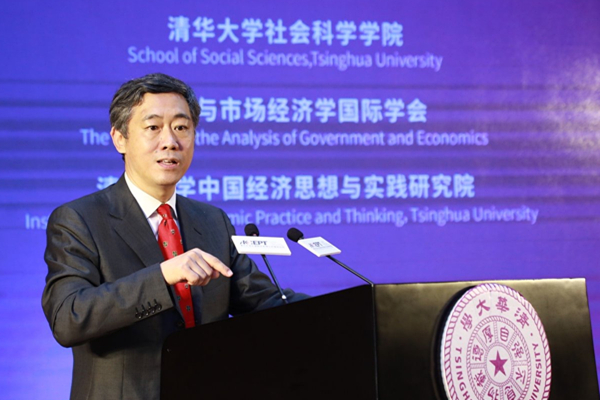
In his opening remarks, David Daokui Li said that the development of economics has been closely linked with China’s destiny. He divided the history of economics into three waves. The first wave began in the 1980s, during the early stage of reform and opening up. Professor Li told the story of a group of young economists who had just returned to the city from the countryside during this time. Some of them had not even graduated from college. Yet, all of them finished their graduation theses on economics while actively participating in the reforms. Professor Li called this “the golden age of economic development, in which a series of theories were put forward.' The second wave was in the 1990s, when many economic scholars went abroad to study Western economic theories and then introduced them to China when they returned, including the theory of property, company governance, and asset pricing. Many of these scholars joined the economics departments of universities. Dr. Li then revealed that the third wave is happening right now. He explained, 'Now we are embracing the third wave of economic research and innovation. Researchers should refine economic theories based on China’s national reality, and Tsinghua University is working hard in this area.'

In the keynote speeches, foreign guests delivered remarks on the topic of government and economics. First, Eric Maskin analyzed the causes of testing kit shortages in the United States during the COVID-19 outbreak from the perspective of mechanism design, then used his analysis to suggest countermeasures. He proposed that the government should use mechanism design to overcome informational deficiencies during the COVID-19 crisis, as an effective mechanism can encourage private production of test kits and maximize social welfare. In addition, he expressed that insights in economics only have real value when they are able to influence policies. Therefore, effective communication between economists and policymakers is essential.
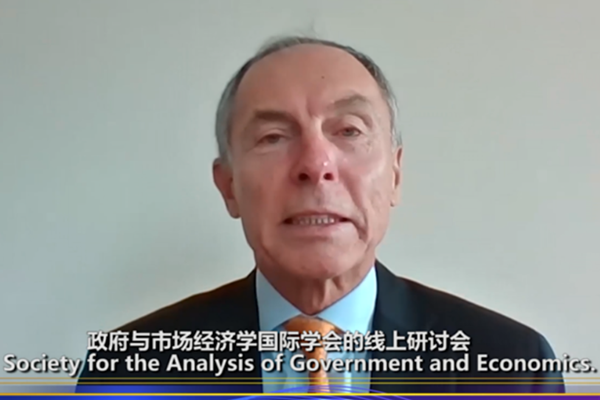
Next, Jan Svejnar reviewed the world economic recession since the COVID-19 outbreak and compared the policies and measures introduced by the European and American governments in response to the pandemic. He hypothesized that the world’s economic recovery from the pandemic will be long and drawn out, and further posited that long-term economic performance will be greatly differentiated across countries and regions because of varied short-term policies. He also pointed out that many countries were not prepared to effectively respond to the pandemic, and cautioned that all governments should learn from this and use this opportunity to upgrade their medical systems and increase their epidemiological research capacities.
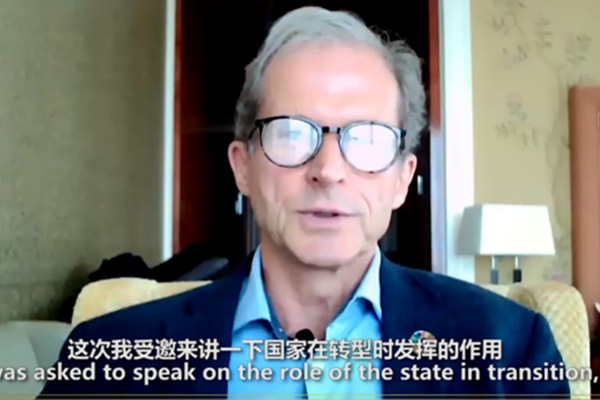
Erik Berglof then explained the importance of strengthening state capacity from the perspective of economic transition and development. He emphasized that the transformation and improvement of economic structures and institutional mechanisms go hand in hand. Improving state capacity and its positive interactions with the private sector can help promote growth, foster innovation, and bring lasting prosperity. Dr. Berglof used infrastructure investment to illustrate the indispensable role of the public sector in financing, sharing risks, strengthening supervision, and improving welfare. In addition, he also pointed out that privatization is not a cure-all for economic transformation and development. Although the private sector plays a very important role, it is equally important to encourage active engagement from the public sector, establish and improve institutional mechanisms, and promote a healthy business climate. Therefore, successful project operation and economic transformation require many compromises.
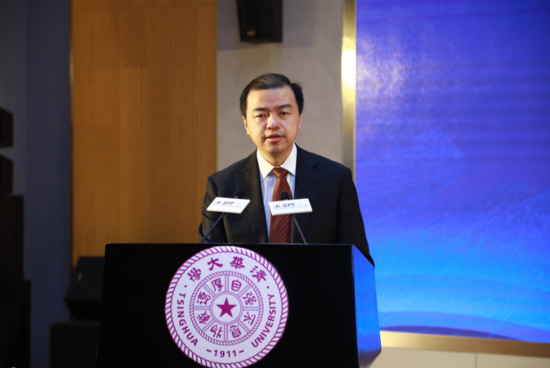
The first of the Chinese guests to speak was Xiang Botao, Deputy Secretary of the CPC Committee of Tsinghua University and Vice Chairperson of the University Council. He expressed that China attaches great importance to the development of philosophy and the social sciences and is working to incorporate Chinese characteristics into these disciplines. This can be seen in the words of President Xi Jinping, who has stated that a country cannot be among the best in the world without the development of the natural sciences, nor can it be a world leader without the development of philosophy and the social sciences. Upholding and developing socialism with Chinese characteristics requires a continuous exploration of practice and theory, and theory guides practice. At present, both the world economy and the Chinese economy are facing major issues which require accurate theoretical answers. In this context, it is more crucial than ever for China to develop robust capabilities in philosophy and the social sciences, which are currently not aligned with the country’s strength and international status. Now, Tsinghua University has the rare opportunity to play an instrumental role in constructing a system of philosophy and social sciences with Chinese characteristics.
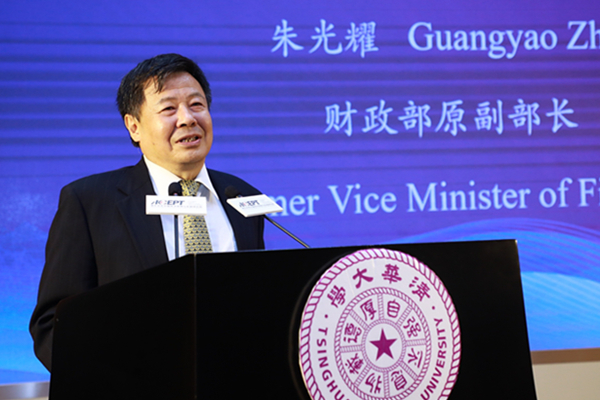
Zhu Guangyao, former Deputy Minister of the Ministry of Finance, began his remarks by outlining the six major uncertainties in the world today, including COVID-19, the fate of global industrial chains and supply chains, the stability of financial markets, the development of the digital economy, climate change, and geopolitics. Regarding the development of the digital economy, Zhu Guangyao pointed out that it has played a positive role in the fight against COVID-19, helping us cope with the impact of the pandemic. The digital economy is gaining ground as a new form of economy, with data at its center. This is a boon for China, which is home to the world’s most effective logistics due to its convenient transportation infrastructure, the world’s largest information flow as a result of its extensive communication base station infrastructure, and an abundant data flow generated by the world’s most widely-used electronic payment system. Logistics, information flow, and data flow are the most precious elements of the digital economy. Thus, China has made considerable progress in establishing the hardware necessary to nourish the digital economy and has a comparative advantage in this regard. Zhu Guangyao stressed that China should focus on establishing a macro policy framework for the digital economy, which will have a long-term, decisive impact in the field.
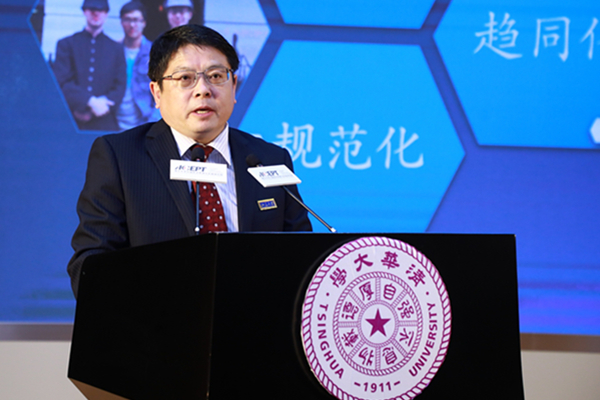
In his comments, Professor Dong Zhiyong, Assistant President and Dean of the School of Economics of Peking University, emphasized that the government and market will always be the two core themes of market operations. He said that the era of the planned economy—during which the government made direct allocations—has taught us many lessons. China’s reform and opening up has been a process of enabling the government to gradually return to its position as referee and release the vitality of market entities.
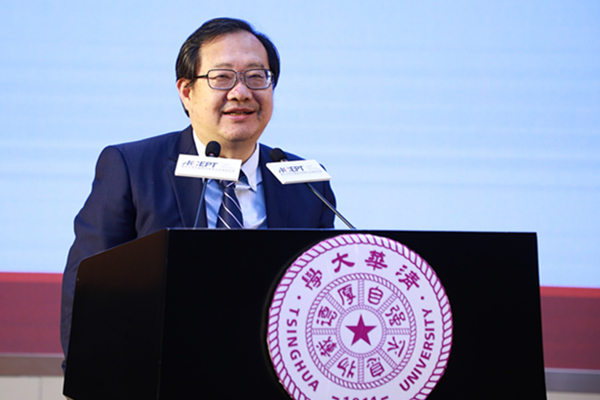
Finally, Liu Shouying, Dean of the School of Economics at Renmin University of China, explained why land is the engine of economic growth in China. Under a pure market economy system, land allocation depends on development needs, but China has also been able to use land allocation for growth. Large land quotas were granted to China’s coastal areas for development, and later to the central and western regions. According to Professor Liu, most people assume that China's land allocation is structured only to guarantee food security and protect cultivated land, but another important and often ignored goal of China’s land allocation is to maintain growth. Compared with developed countries and other developing countries, China allocates 40% of its land for industrial purposes to maintain a manufacturing advantage. However, since 2008, the decline in land demand has led to the intensive development of industrialized land, and the cost of urbanization has risen sharply. Therefore, China must pay extra attention to high-quality economic development in the future.